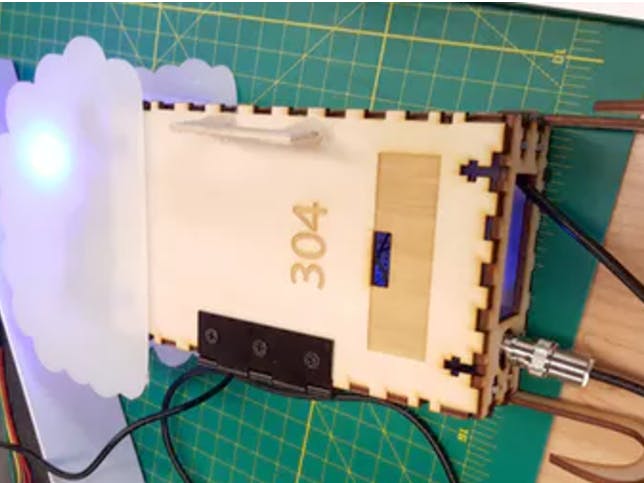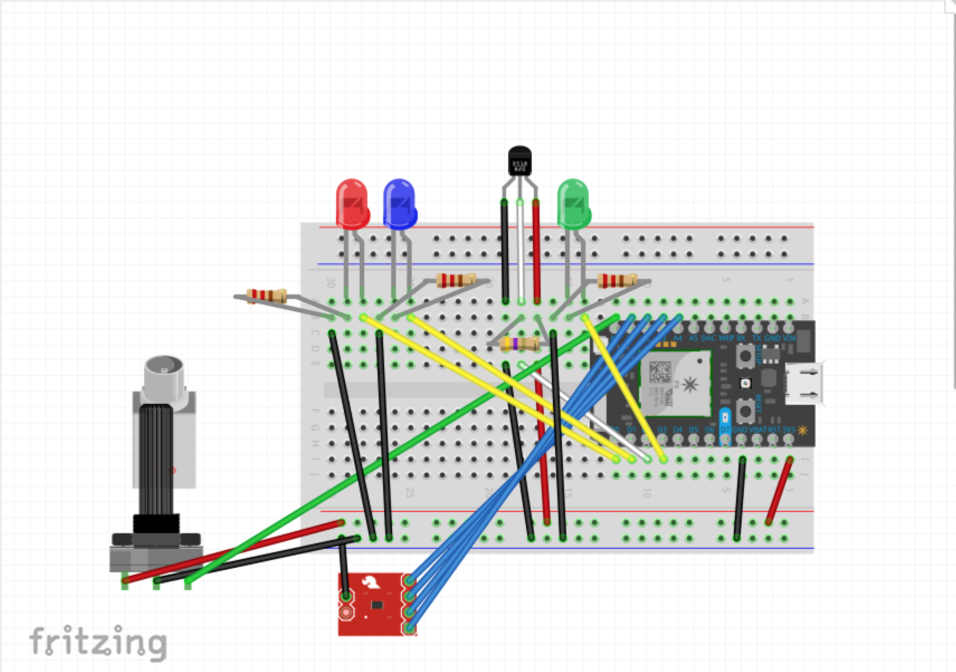// This #include statement was automatically added by the Particle IDE.
#include "DallasTemperature.h"
// This #include statement was automatically added by the Particle IDE.
#include <OneWire.h>
// This #include statement was automatically added by the Particle IDE.
#include <SparkFunPhant.h>
double tempParticle;
double phParticle;
double tooBasic = 10.0;
double tooAcidic = 4.0;
//ph code
#define SensorPin A0 //pH meter Analog output to Arduino Analog Input 0
#define Offset -21.20 //deviation compensate
#define LED 13
#define LEDRED 12
#define LEDBLUE 11
#define samplingInterval 20
#define printInterval 800
#define ArrayLenth 40 //times of collection
int pHArray[ArrayLenth]; //Store the average value of the sensor feedback
int pHArrayIndex=0;
//////////////////////////////////
//Temperature Code
#define ONE_WIRE_BUS D2
#define TEMPERATURE_PRECISION 9
OneWire oneWire(ONE_WIRE_BUS);
DallasTemperature sensors(&oneWire);
//Run I2C Scanner to get address of DS18B20(s)
DeviceAddress inWaterThermometer = { 0x28, 0x56, 0xCB, 0x7F, 0x8, 0x0, 0x0, 0xC7 };
//CHNAGE TO YOUR DEVICE'S ADDRESS
double InTempC = -1;
double waterTempF = -1;
void update18B20Temp(DeviceAddress deviceAddress, double &tempC);
/////////////////////////////////
//Given Phant Code
double value1 = 0; //number 1 clicked
double value2 = 0; //number 2 clicked
const char server[] = "data.sparkfun.com"; // Phant destination server
const char publicKey[] = "0lw6ZGVRyOcNMwYMZ0WO"; // Phant public key - HAS TO BE CHANGED
const char privateKey[] = "D6vVmNoZyqiqaPEa8DjB"; // Phant private key - HAS TO BE CHANGED
Phant phant(server, publicKey, privateKey); // Create a Phant object
const int POST_RATE = 3000; // Time between posts, in ms.
unsigned long lastPost = 0; // global variable to keep track of last post time
void setup() {
Particle.variable("ph", phParticle);
Particle.variable("tempParticle", tempParticle);
// DS18B20 initialization
pinMode(LED,OUTPUT);
pinMode(LEDRED, OUTPUT);
pinMode(LEDBLUE, OUTPUT);
sensors.begin();
sensors.setResolution(inWaterThermometer, TEMPERATURE_PRECISION);
Serial.begin(9600);
}
void loop() {
//Serial.println(digitalRead(6));
//delay(5000);
//value1++;
//value2++;
//Replace the if statement below with whatever your trigger is
//PH Loop
static unsigned long samplingTime = millis();
static unsigned long printTime = millis();
static float pHValue,voltage;
if(millis()-samplingTime > samplingInterval)
{
pHArray[pHArrayIndex++]=analogRead(SensorPin);
if(pHArrayIndex==ArrayLenth)pHArrayIndex=0;
voltage = avergearray(pHArray, ArrayLenth)*5.0/1024;
pHValue = 3.5*voltage+Offset;
samplingTime=millis();
}
if(millis() - printTime > printInterval) //Every 800 milliseconds, print a numerical, convert the state of the LED indicator
{
Serial.print("Voltage:");
Serial.print(voltage,2);
Serial.print(" pH value: ");
Serial.println(pHValue,2);
printTime=millis();
if(pHValue < tooBasic && pHValue > tooAcidic )
{
digitalWrite(LED, HIGH);
delay(1000);
digitalWrite(LED, LOW);
// printTime=millis();
}
else if(pHValue < tooAcidic)
{
digitalWrite(LEDRED, HIGH);
delay(1000);
digitalWrite(LEDRED, LOW);
// printTime=millis();
}
else if(pHValue > tooBasic)
{
digitalWrite(LEDBLUE, HIGH);
delay(1000);
digitalWrite(LEDBLUE, LOW);
// printTime=millis();
}
}
phParticle = pHValue;
////////////////////////////
//Temperature Loop
// DS18B20
sensors.requestTemperatures();
update18B20Temp(inWaterThermometer, InTempC);
waterTempF = (InTempC * 9)/5 + 32;
Serial.print("Water Temp:");
Serial.print(waterTempF);
Serial.println("F");
tempParticle = waterTempF;
/////////////////////////////
//Button Code Below
boolean somethingHappened = false;
Serial.println(digitalRead(4) + " d4");
Serial.println(digitalRead(3) + " d3");
delay(2000);
//If statement for phant
/* if(digitalRead(4) == 0) //When button 1 is clicked
{
Serial.print("d4 clicked ");
value1 = 1;
somethingHappened = true;
}
if(digitalRead(3)==0) //When button 2 is clicked
{
Serial.print("d3 clicked ");
value2 = 1;
somethingHappened = true;
}
if (somethingHappened)
{
// postToPhant();
}
value1 = 0;
value2 = 0;
*/
}
int postToPhant()
{
// Use phant.add(<field>, <value>) to add data to each field.
// Phant requires you to update each and every field before posting,
// make sure all fields defined in the stream are added here.
phant.add("ph", value1);
phant.add("temp", value2);
TCPClient client;
char response[512];
int i = 0;
int retVal = 0;
if (client.connect(server, 80)) // Connect to the server
{
// Post message to indicate connect success
Serial.println("Posting!");
// phant.post() will return a string formatted as an HTTP POST.
// It'll include all of the field/data values we added before.
// Use client.print() to send that string to the server.
client.print(phant.post());
delay(1000);
// Now we'll do some simple checking to see what (if any) response
// the server gives us.
while (client.available())
{
char c = client.read();
Serial.print(c); // Print the response for debugging help.
if (i < 512)
response[i++] = c; // Add character to response string
}
// Search the response string for "200 OK", if that's found the post
// succeeded.
if (strstr(response, "200 OK"))
{
Serial.println("Post success!");
retVal = 1;
}
else if (strstr(response, "400 Bad Request"))
{ // "400 Bad Request" means the Phant POST was formatted incorrectly.
// This most commonly ocurrs because a field is either missing,
// duplicated, or misspelled.
Serial.println("Bad request");
retVal = -1;
}
else
{
// Otherwise we got a response we weren't looking for.
retVal = -2;
}
}
else
{ // If the connection failed, print a message:
Serial.println("connection failed");
retVal = -3;
}
client.stop(); // Close the connection to server.
return retVal; // Return error (or success) code.
}
//temperature method
void update18B20Temp(DeviceAddress deviceAddress, double &tempC)
{
tempC = sensors.getTempC(deviceAddress);
}
//ph method
double avergearray(int* arr, int number){
int i;
int max,min;
double avg;
long amount=0;
if(number<=0){
Serial.println("Error number for the array to avraging!/n");
return 0;
}
if(number<5){ //less than 5, calculated directly statistics
for(i=0;i<number;i++){
amount+=arr[i];
}
avg = amount/number;
return avg;
}else{
if(arr[0]<arr[1]){
min = arr[0];max=arr[1];
}
else{
min=arr[1];max=arr[0];
}
for(i=2;i<number;i++){
if(arr[i]<min){
amount+=min; //arr<min
min=arr[i];
}else {
if(arr[i]>max){
amount+=max; //arr>max
max=arr[i];
}else{
amount+=arr[i]; //min<=arr<=max
}
}//if
}//for
avg = (double)amount/(number-2);
}//if
return avg;
}














Comments